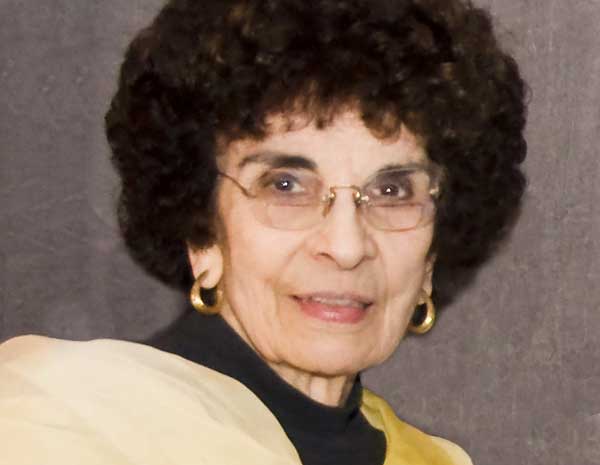WASHINGTON (RNS) Nellie Gray, the longtime leader of the annual March for Life, which protests the 1973 Roe v. Wade decision that legalized abortion, has died at age 88.
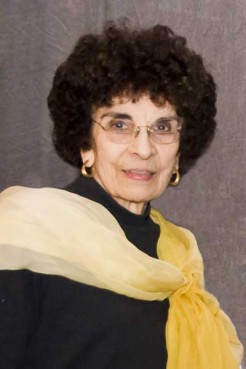
Nellie Gray, the octogenarian who founded March for Life, the annual protest of the 1973 Roe v. Wade decision legalizing abortion, has died.
The March for Life website said Tuesday (Aug. 14) that Gray died “over the weekend.”
“Until the very last moment of her life, Nellie pressed for unity in the prolife movement,” the website states. “She firmly believed that not a single preborn life should be sacrificed for any reason.”
The Rev. Frank Pavone, a high-profile anti-abortion activist and national director of Priests for Life, has been a march participant since 1976.
“Every year since 1974, Nellie Gray has mobilized a diverse and energetic army for life,” he said. “Her own commitment to the cause never wavered. She was a tireless warrior for the unborn and her motto was 'no exceptions.’”
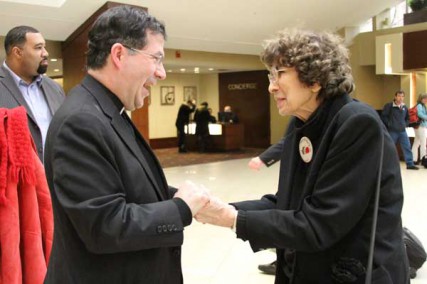
Father Frank Pavone of Priests for Life greets Nellie Gray, the matriarch of the annual March for Life rally against abortion, in January 2012 in Washington.
In a 1998 interview with Religion News Service, Gray said she and about 30 other anti-abortion activists met at her Capitol Hill home in the fall of 1973 to plan a demonstration on the one-year anniversary of the Supreme Court decision. She acknowledged then with amusement that she was naive about their plans.
“We just thought we were going to march one time and Congress would certainly pay attention to 20,000 people coming in the middle of winter to tell them to overturn Roe vs. Wade,” she said.
The January marches have continued since then — along with counter protests — and are known for their large and youthful presence in the nation’s capital. Through snow and cold, Gray and her co-laborers in the anti-abortion movement have rallied in the shadow of the White House before marching to the Supreme Court.
A retired federal worker from Big Spring, Texas, Gray was a legislation attorney who had served as a corporal in the Women's Army Corps during World War II.
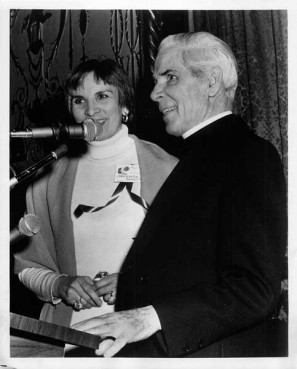
Washington, D.C. – Nellie Gray, founder and president of the March for Life, introduces Archbishop Fulton J. Sheen to a “pro-life” vigil and coffee hour which took place on the evening before the March for Life in Washington. (1977)
Though a Roman Catholic, she told RNS near the 25th anniversary of Roe v. Wade that her fight against abortion was more about human rights than religion.
“The individual person is extremely important to me,” she said. “When I heard about abortion, I really could not believe that America was entering into … killing its own innocent children. I just could not believe this and I just said, 'Not in my country, you don't do that.’”
Boston Cardinal Sean O'Malley once dubbed her the “the Joan of Arc of the Gospel of life,” and other anti-abortion leaders praised Gray as the behind-the-scenes matriarch of their cause.
“Nellie lived a life of heroic service to the unborn,” said Tony Perkins, president of the Family Research Council. “Nellie will be remembered most for her passionate and ardent protection of every life, without exception.”
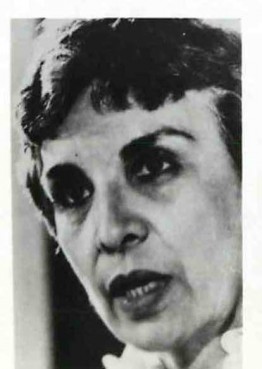
Nellie Gray of the March for Life speaks at a press conference in Washington on June 30, 1980 after the U.S. Supreme Court ruled that the federal government and individual states are not compelled to fund abortions for women on welfare.
Melinda Delahoyde, president of Care Net, which runs pregnancy centers across the country, noted the octogenarian’s influence on the many young people who turned out to march with her.
“The March — and Nellie’s personal example –motivated, energized and inspired generations of life-affirming leaders and local activists,” she said.
